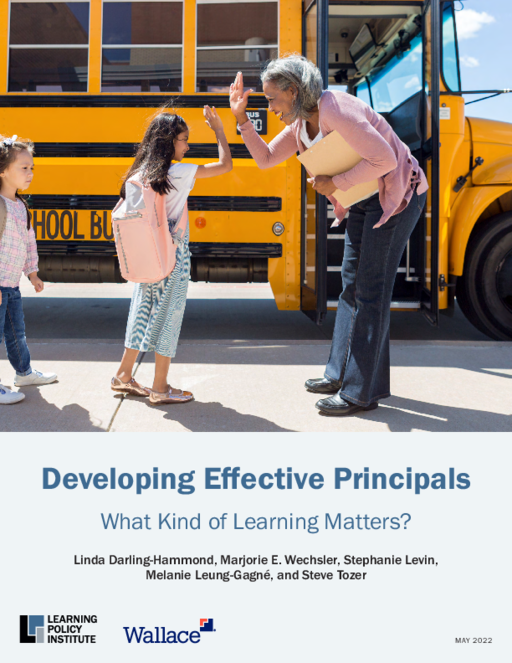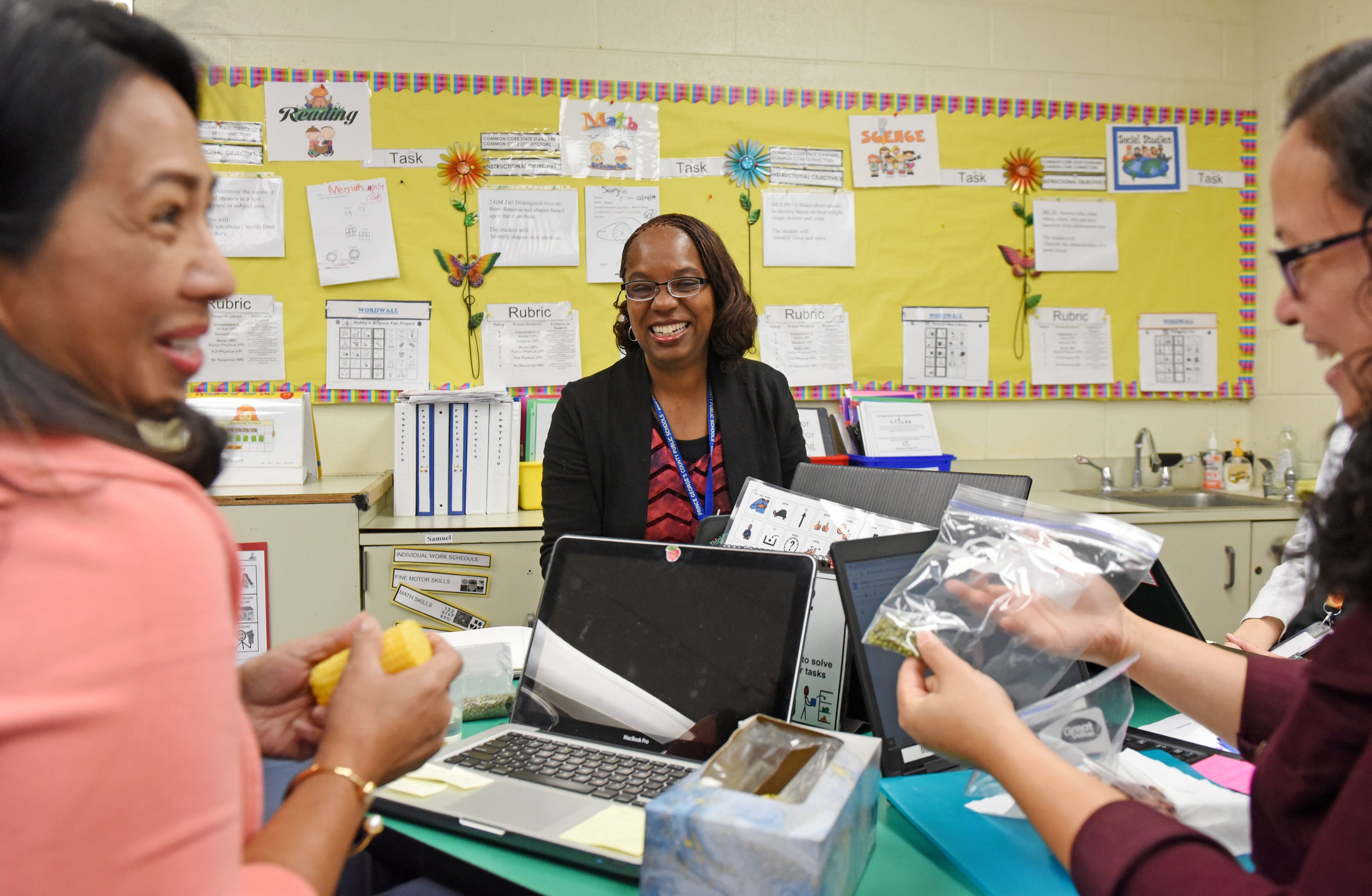Breadcrumb
- Wallace
- Reports
- Developing Effective Principals ...
Developing Effective Principals
What Kind of Learning Matters?

- Author(s)
- Linda Darling-Hammond, Marjorie E. Wechsler, Stephanie Levin, Melanie Leung-Gagné, and Steve Tozer
- Publisher(s)
- The Learning Policy Institute
- DOI Link
- https://doi.org/10.54300/641.201
Summary
How we did this
The authors reviewed and synthesized the peer-reviewed research from 2000 to 2021 that met criteria for addressing the features of principal preparation and development programs and their relationship to principal, teacher, and student outcomes.
This report reviews the research literature from 2000 to 2021 on principal preparation programs and professional development. It finds that high-quality learning programs for future and current principals are associated with positive outcomes for principals, teachers, and students. These outcomes include:
- Principals reporting increased preparedness and more effective practices
- Staff perceptions of school climate
- Teacher retention
- Student achievement.
The report examines how much opportunity principals have for high-quality learning. It also examines the policies that drive the development of high-quality programs and access to them.
High-quality principal preparation has common elements:
- Rigorous recruitment of candidates into the program
- Close school district-university partnerships
- Groupings of enrollees into cohorts
- Experiences where candidates apply what they learn, guided by experienced mentors or coaches
- A focus on important content. The five most important areas are leading instruction, managing change, developing people, shaping a positive school culture, and meeting the needs of diverse learners. Even a single course about meeting the needs of diverse learners can be linked to the development of principals’ skills in this area.
Improvements but Continued Gaps
Access to preservice and in-service learning covering important content has improved over the last decade. More than two-thirds of principals today report having had at least minimal access to learning across the five key content areas.
At the same time, there are clearly gaps. Most principals still wanted more professional development on nearly all topics. Lack of time and insufficient money were obstacles to further learning. And few principals reported having access to job-based learning opportunities that research finds are important to their development.
- Less than half of principals who had internships during their preparation reported being allowed to take on responsibilities typical of an educational leader.
- Very few in-service principals reported having access to coaching or mentoring.
Access to high-quality professional development for principals also varies by school poverty level. This is true both nationally and within states. Across the country, principals serving high-poverty schools were less likely to report high-quality learning opportunities than principals in schools serving fewer low-income students. For example, principals serving high-poverty schools were less than half as likely to have an on-the-job mentor or coach as principals serving low-poverty schools.
The Role of Policy
Policies that support high-quality principal learning programs can make a difference. More state and local policymakers have adopted standards for principal licensing and program accreditation. These can be important levers for improvement. Access to high-quality principal learning increases when public policies are strong and well-implemented.
The authors make policy recommendations based on their research synthesis. These recommendations include:
- Better use of state licensing and program approval standards to support high-quality principal preparation and development
- Investments in statewide systems for principal professional learning
- Greater public investment in professional learning for principals in high-poverty schools
- State support for districts to create comprehensive systems for developing effective principals.
Key Takeways
- High-quality principal preparation and professional development programs are associated with positive outcomes for principals, teachers, and students. These outcomes include principals’ reports of their effectiveness, staff perception of school climate, teacher retention, and student achievement.
- High-quality principal preparation includes content learning and opportunities to practice leadership skills in schools, such as through an internship. Preparation is especially effective when it includes experienced, expert mentoring.
- The quality of content learning for aspiring principals has increased since about 2010. The five most important content areas are leading instruction, managing change, developing people, shaping a positive school culture, and meeting the needs of diverse learners. More than two-thirds of principals today report having had at least minimal access to learning across the five topics. But most principals wanted more professional development in these areas.
- Learning through internships, coaching, or mentoring is a weak area for principal preparation nationally. Less than half of aspiring principals with internships get the opportunity to practice leadership skills. Few principals get coaching or mentoring.
- Principals serving high-poverty schools were less likely to report high-quality learning opportunities than principals in schools serving fewer low-income students. For example, principals serving high-poverty schools were less than half as likely to have an on-the-job mentor or coach as principals serving low-poverty schools.
- Policies that support high-quality principal learning programs can make a difference. Access to high-quality principal learning increases when public policies are strong and well-implemented.
Materials & Downloads
What We Don't Know
- The current research on principal learning opportunities focuses heavily on the structures for principal learning, such as workshops or coaching. It has focused less on content. To what extent and in what ways are principals gaining the knowledge, skills, and dispositions they need to be successful?
- While there is emerging literature on preparing aspiring principals to serve diverse learners, there is scant attention to this in the literature on professional development for sitting principals. In what ways can principals learn to meet the needs of diverse learners?
- The success of a professional learning experience for principals or aspiring principals can depend on their prior knowledge and skills. Can research better explore how the learner’s background affects the outcomes of principal preparation or professional development?
- Researchers often examine the immediate outcomes of principal learning. But research shows that it can take three years for a principal to make a measurable difference in a school. What is the impact of principal learning over time? How does that learning translate into behaviors and practices and then into influences on staff members and students?


